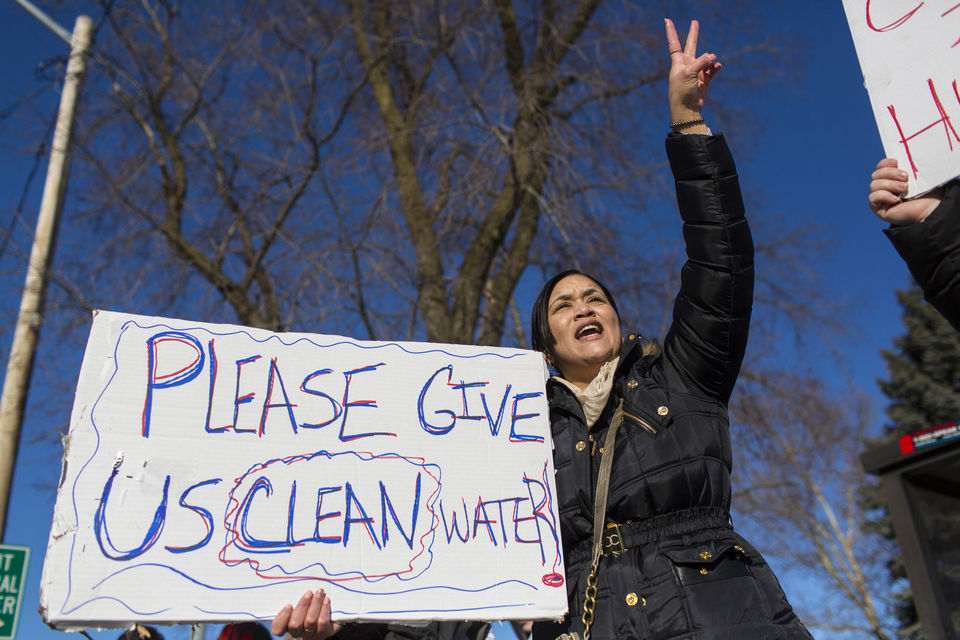Last night [Sunday, February 28] film director Ryan Coogler decided to divert attention from #OscarsSoWhite back to #JusticeForFlint with an impressive fundraising event, which featured powerful performances from local poets and the likes of Jazmine Sullivan, Stevie Wonder, Janelle Monae and Dej Loaf. The event also included speeches from actor Jesse Williams and the citizens of Flint. One of the most heartbreaking issues to be raised at the event came from a mother who had lost her unborn twins to the lead contamination. This article was inspired by her story.
The crisis began in April 2014, when the local authorities decided to switch the city’s water supply from Lake Huron to the local Flint River in a bid to save money. At the time the Michigan department of environmental quality did not see a need for the water to be treated with anti-corrosion agents and so the chloride-heavy water proceeded to carry lead from the pipes into the public’s water supply. By October 2014 Governor Rick Snyder was advised that the condition of the water was “downright scary” and despite this he put off declaring a state of emergency until October 2015, when local studies revealed the extent of blood poisoning apparent in local children.
The people of Flint have been demanding answers for their discolored, pungent water for over a year now and are growing increasingly concerned about the long term health implications caused by their exposure to lead for almost two years. Children, elderly people, pregnant women and breastfeeding mothers are at the highest risk of being affected. Symptoms of hair loss and skin lesions in the elderly, rashes, slower cognitive ability and behavioral issues in children and pregnancy complications for women are rife. The effects of lead poisoning can continue for years after the exposure has been eliminated and could lead to huge financial and physical costs for the future.
Pediatrician Dr Mona Hanna-Attisha spoke at the #JusticeForFlint event about Flint residents being targeted just for “living in a poor city” and has also spoken in the past about the future need for special education programs for those affected and the cycle of the criminal justice system for disadvantaged youths. Local mother Lee Anne Walters spoke about how nonchalant nurses had been about the effect of lead poisoning on her children – “it’s not as bad as it could be, he’s only going to lose a few IQ points” – and her efforts in determining the level of lead poisoning she had discovered in her water supply. Her independent researcher found a lead level of 397ppb in her house, which, in comparison to the Environmental Protection Agency’s finding that just 15ppb can cause “irreversible brain damage”, is utterly ridiculous.
On January 16, President Obama declared a state of emergency and gave the green light for $85 million to be spent on helping the city to recover. The National Guard was deployed to offer aid in the form of bottled water and filters and media attention has led to increased financial support from celebrities and civilians alike. Women have truly been the forerunners in the efforts to raise awareness and demand answers for the state of the water, from organizing water tests to rallying community support. An estimate of over 9,000 children and thousands of pregnant women have been affected by the crisis in Flint, which has a predominantly poor and Black population. The staggering poverty in the area has contributed to the crisis majorly, as people cannot afford to substitute their water with fresh bottled water and so expose themselves to poisoning more than necessary.
This is the type of reproductive health crisis you would expect from a third world country, not a state in the most powerful country in the world. The World Health Organization reports that there is no known safe amount of lead the human body can tolerate and the severity of its effects are increased the longer people are exposed to contamination. Lead can cause anemia, hypertension and central nervous system damage, which can cause convulsions, comas and even death to those exposed. In pregnant women it can cause premature births, lower birth weights, increased rates of miscarriage and in men, lower sperm counts.
Healthcare institutions and schools are doing their best to raise awareness, but as the Michigan Welfare Rights Organization’s Orduño states: “I don’t see how there can ever really be adequate solutions, or recourse, or reparations for any of this.” Maybe a good start would be to stop billing already impoverished people for poisoned water, to tap into fresher resources surrounding Michigan for better water and to put laws in place to ensure that this kind of tragedy never happens again for the sake of money. Health and peace of mind are way more valuable.
